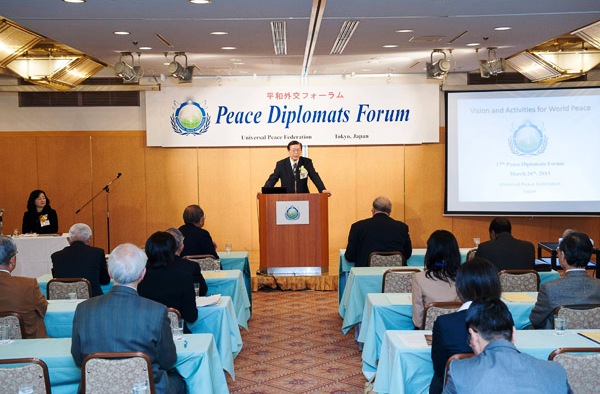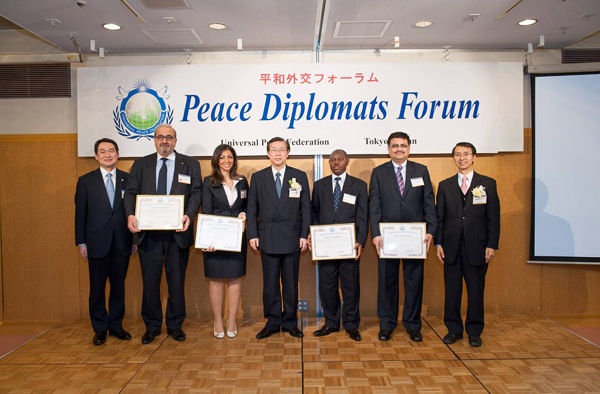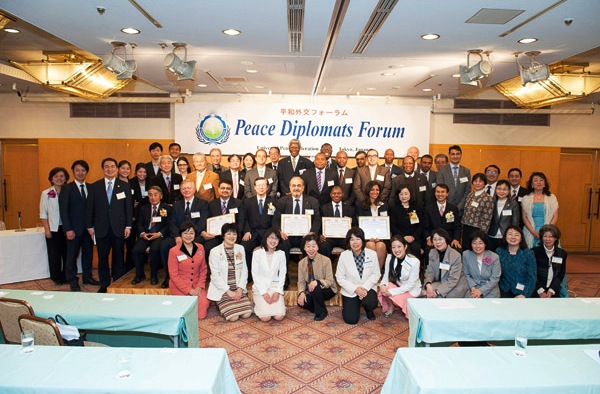![]()
The Words of the Kato Family
|
|
The Words of the Kato Family |

Tokyo, Japan -- "Arts and culture are potent ingredients in conflict prevention and resolution, peacekeeping and peace building," emphasized Dr. Akiko Fukushima, a Research Fellow of Aoyama Gakuin University's Joint Research Institute for International Peace and Culture, at the 17th Peace Diplomats Forum organized by UPF-Japan in Tokyo on March 26.
The Forum was held on the theme, "Conflict and Culture: Building Peace through Cultural Activities" with 50 participants including two Ambassadors and over 20 senior diplomats from embassies in Tokyo, officers from United Nations and Ministry of Foreign Affairs, and many leaders from various fields.
At the beginning, Rev. Eiji Tokuno, Co-Chairman of UPF-Japan, gave the welcoming remarks and introduced the achievements of Rev. Dr. Sun Myung Moon, the Founder of UPF.
A former parliament member who then gave congratulatory remarks explained the teaching of jiri-rita (benefiting others) in Buddhism as a peace principle and said, "We should not only keep peace, but create peace."

Then, Mr. Seiichi Kikuya, Secretary General of UPF-Japan, gave a report on the World Summit 2013 organized by UPF in Korea in February.
The keynote speech was given by Dr. Fukushima on the power of culture in building peace based on her several years of research in conflict regions.
She pointed to a widely-accepted belief that cultures cause conflicts and indicated that she does not support such belief.
"When you analyze instances in depth, you often find that the roots of conflicts are territorial or economic disputes, questions of access to resources, and other issues. However, those who want to expand these disputes into violent conflicts often use cultural differences as a trigger. Therefore, people who are working to prevent or resolve conflict, foster peace, and reconstruct war-torn societies must take culture into account," said Dr. Fukushima.
She then introduced some of the practices to foster peace through cultural activities, such as the inter-ethnic soccer project to build tolerance and trust in Bosnia and Herzegovina, multi-ethnic orchestra project initiated by a Japanese conductor as a bridge to coexistence in Kosovo, and a drama workshop organized by some NGOs in Aceh, Indonesia, after the Sumatra earthquake and tsunami to cultivate mutual understanding among people from mutually hostile groups.

She also warned, "Although culture is essential for consolidation of peace and conflict resolution, it should never be used for political ends."
In conclusion, she mentioned that arts and culture facilitate peace by providing the following five benefits; 1) a common time and space; 2) the opportunity to see their conflicts relative to other things; 3) the chance to heal conflict trauma and to build a new identity; 4) development of tolerance, trust, and confidence; and 5) recovery of self-esteem and pride.
At the end of the program, four new Ambassadors for Peace were appointed and the certificates were handed to them by Rev. Tokuno.